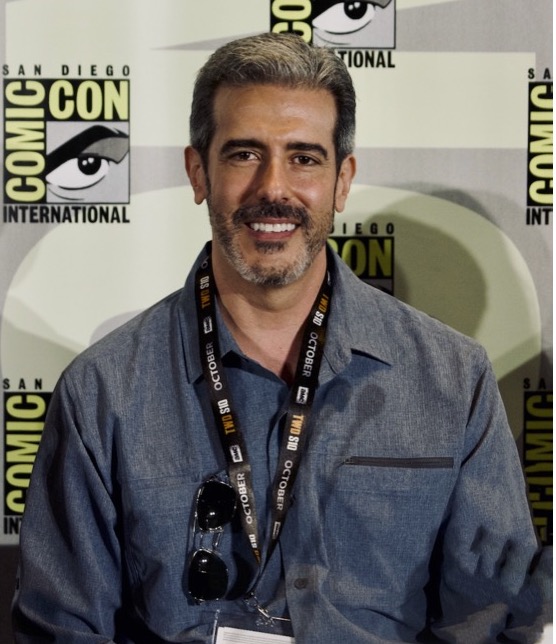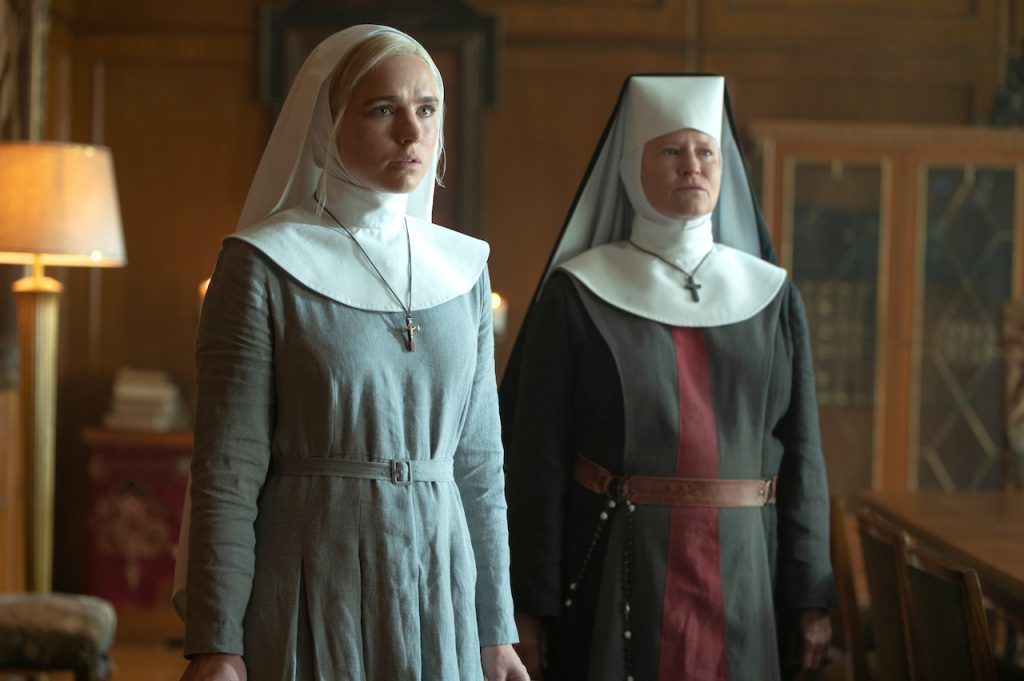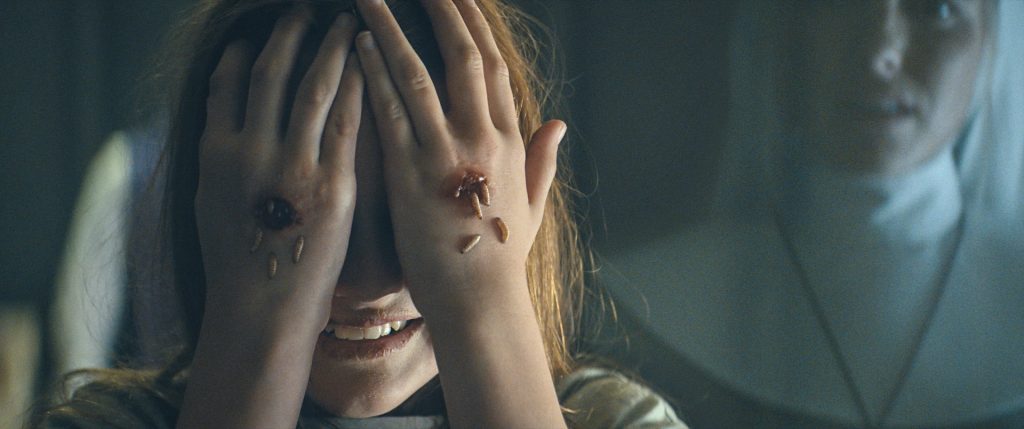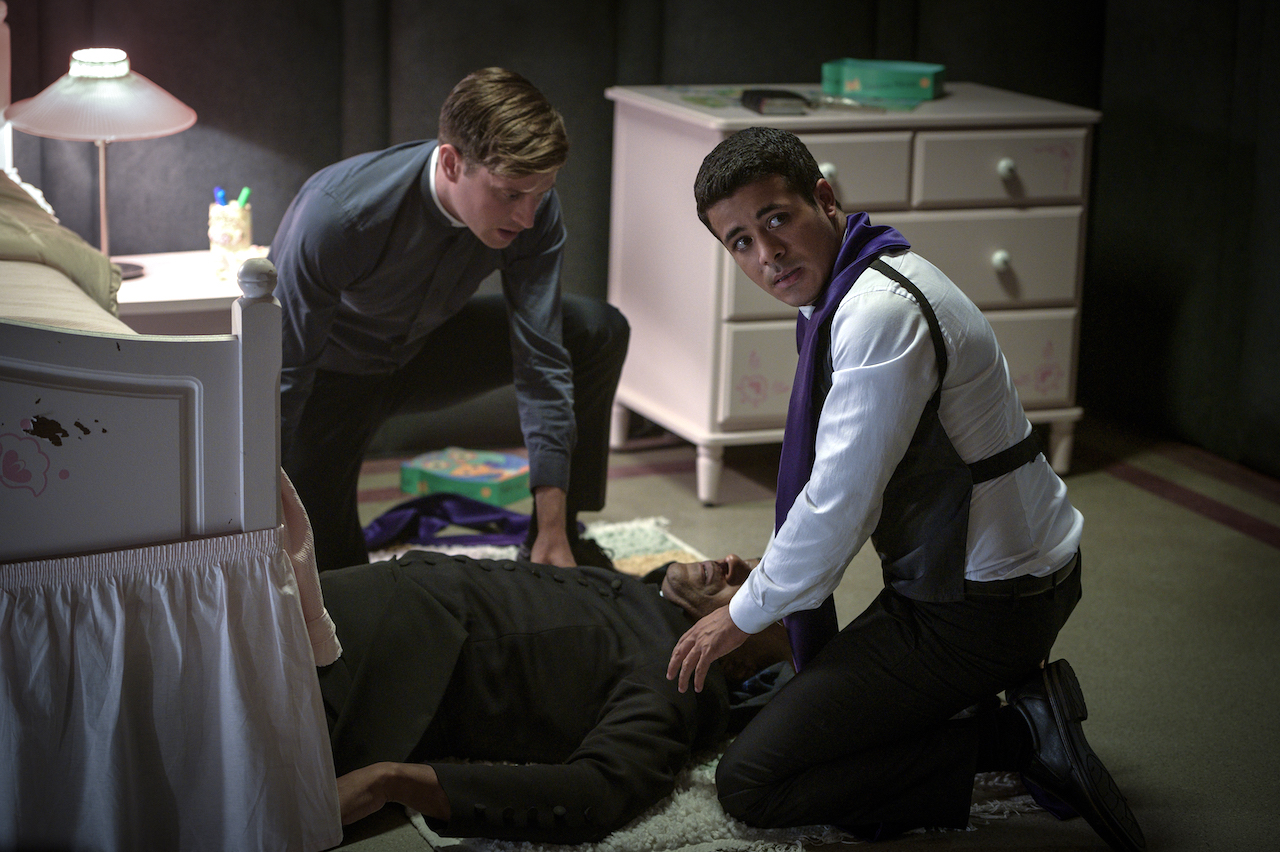Halloween is here which means there will be plenty of horror fare to choose from. One new release to keep an eye out for is Prey for the Devil. Directed by Daniel Stamm and written by Robert Zappia, Todd Jones and Earl Richey Jones, the Lionsgate flick is a fresh take on the exorcism genre. Revolving around an exorcism school in Italy that trains priests to do exorcisms, the story focuses on a nun, Sister Ann, who wants to break tradition and participate in the demon-removing rituals. Because of her past, she believes she has an advantage a lot of the priests don’t.
Wide-eyed Jacqueline Byers inhabits the role of the conflicted, tormented Sister Ann. Colin Salmon as Father Quinn dominates whatever scene he’s in with his magnetic presence. Christian Navarro nails his role as Father Dante, full of conviction and optimism. Posy Taylor, who plays the possessed young Natalie, had never had any film or television roles prior to this. She easily flits from innocent to sinister. Ben Cross and Virginia Madsen also have significant roles. Daniel Stramm’s (The Last Exorcism) directing is effective and atmospheric. There are a few jump scares, but there’s more emphasis on mood and character arc, with a Constantine-ish edge.
The Exorcist (1973) is the benchmark for films about exorcism and is often considered one of the scariest films of all time. Prior to its release, the exorcism niche in horror was absent. After its release, there have been a slew of impressive, inspired films, including The Conjuring, The Exorcism of Emily Rose, and The Taking of Deborah Logan.

Robert Zappia
Screenwriter Robert Zappia got his start in comedy and has only done one other horror film, Halloween: H20 (1998). The USC grad’s sophomore horror effort is a noteworthy one. He recently spoke with us about Prey for the Devil and the importance of doing research for films like this.
How do you prepare a pitch?
This is interesting because the pitch is not my strongest attribute as a writer. I actually try to avoid pitching. I feel like I’m much stronger on the page than I am verbally pitching a story. Instead of pitching, I’ll write the spec. It’s time consuming, but I’ve found my batting average is better when I present it on the page. Pitching is an art. I have two friends who are producers on this film, Todd and Richey Jones, who are great at it. In ten minutes, they can give you the full breadth of the story and the characters.
How long should a treatment be for a horror feature?
Prey for the Devil is a story I came up with with Todd and Richey Jones. We joined up with Jessica Malanafy, who’s also a producer on the film. Over the course of a couple of months, we worked out the story. I did a four-to-five-page treatment which basically laid out our central characters, the broad strokes of the story, and some set pieces. That’s what I wrote the first draft from. I don’t like to overthink it. I know some writers like to write twenty to twenty-five page treatments. For me that takes out the fun of the actual writing, discovery, and letting the characters lead you. I do like having those signposts along the way.
When you write, do you have to have a particular setting?
I’m a terrible procrastinator. My wife loves it when I’m writing because the house is spotless because I clean. Sometimes, I rent a hotel room for a two week stretch and barricade myself in. I’ll leave for one meal. But other than that, I’m just writing, from dusk until dawn. No internet, unless I need to do research.
When you start writing a feature, do you start with characters, plot, or outline?
I start with the hook. Characters usually come after I have a story logline that excites me. It could be a title too that sparks me. I had a miniseries many years ago that was on Syfy network. The original title was Six Days to Sunday. I just liked the way the title sounded. From there I came up with a story that ended up being this miniseries. Whereas with Prey for the Devil, it was about this article I read about a rise in possessions globally and that there’s a shortage of priests.

Sister Ann (Jacqueline Byers) and Sister Euphemia (Lisa Palfrey) Photo by Vlad Cioplea/ Lionsgate
What do you think was the cause of the rise in possessions?
I was able to talk to Father Vince Lampert who’s an exorcist in Indianapolis. I asked him that same question and he said he thinks it’s a few things. One, lack of faith; people are moving away from faith and God. They’re also dabbling in things they don’t quite understand that are dangerous. When I was a kid, you could go to the toy store and buy a Ouija Board from Parker Bros. I bought it and my Italian grandmother went nuts. She tossed that thing in the trash so fast. In his opinion, even things like the Harry Potter series, which deals with witchcraft, are dangerous. People dabble in that and kind of leave themselves open. I think the biggest explanation was people turning away from a belief in a higher power.
What are some of the best writing lessons you’ve learned from writing horror?
I’m going to go back to a lesson I learned when I was writing sitcoms. Very different world, but it absolutely applies. Matt Williams, who created Home Improvement, was my mentor. I would write these specs that were terrible. I had written a Home Improvement spec and he read it. His note to me was ‘I want you to go back and rewrite this without a single joke.’ I was like, ‘But it’s a sitcom.’ His response was, ‘You’re focusing too much on the setup and the punchline. So, what you need to do is to go back and write it as a straight character piece.’ That lesson has stuck with me ever since. Even when I’m doing horror, I try to avoid relying on those set pieces. Because horror is very much like comedy, there’s a setup and a delivery, it’s just a scare rather than a laugh. I like to go through and write it without any scares and focus on the characters and the relationships and what they’re dealing with. This has helped me in every genre.
What was the inspiration for Prey for the Devil? How did the project come about?
I mentioned Todd and Richey Jones. I met them on a show called Buddies, which was in the mid-90s. It was Dave Chappelle’s first foray into television. Unfortunately, the show didn’t succeed, but Todd, Richey and I formed a lifelong friendship. We always wanted to work together. Around 2017 they came to me and said they knew Jessica Malanafy, who worked at Blumhouse and went on to work for Illumination Films, where they met her. She was trying to break into independent producing of horror. They asked the Jones brothers if they knew of anyone, and they thought of me right away. They asked me if I had anything percolating and I’d just read that article about possessions on the rise. I remember this like it was yesterday. It was around Christmas time; they were in my livingroom and we started just talking. I said, ‘Well, what if they open up schools in the U.S.?’ We just started pitching each other. We got so excited after this hour of discussion; we basically had the story of what’s now the film. From there, it just took off.

Natalia (Posy Taylor). Photo courtesy of Lionsgate
How long did it take you to write the first draft?
Two weeks. Locked in a hotel room. I like the 24 hours because I can eat, which I do a lot of when I write, any time I want.
How much research did you have to do?
Quite a lot. I have a deacon at my local church parish who’s a close friend and he was invaluable. He helped me connect with other exorcists in the diocese. Listening to real live exorcisms on audio, watching videos and documentaries… it was frightening. When you listen to an audio account of it, you wonder where that voice is coming from… it’s inhuman. I spoke to one exorcist, and he went over his experiences, then said, ‘That’s what I can tell you.’ I remember thinking, ‘That was pretty frightening and that’s what you can tell me? What aren’t you telling me?’
Did anything spooky happen on the set?
No, which is fascinating. Todd and Richey are very prayerful, so they were saying prayers to make sure all went well.
When you made that leap from comedy to writing your first horror feature, Halloween: H20, what difficulties did you encounter?
My talents lend themselves more towards thrillers or horror. The challenge was comedy, so I felt a little more at home in the thriller space. For me the challenge was also personality. Wind Dancer was very family oriented and had an atmosphere conducive to creativity. There wasn’t a lot of ego involved. They valued the PA’s opinion like they valued the EP’s opinion. It was a very familial atmosphere and I worked there for six years. So, to go from that to Bob and Harvey Weinstein was a little different…! I went from people who were nurturing and loving to people who weren’t. They were business, cut and dry. If you took a creative misstep, you were called every name in the book.
What lessons did you learn from writing that first horror script that informed this current one?
My biggest growth was learning to hear notes, stick with them, and not to outright dismiss them. To do my best to apply the notes. Because I was not that person in the beginning. What I’ve learned is initially the note might not ring true or might feel false but if I just sit with it and think about how I can implement the spirit of that note the way that I think makes it better and in way that makes them happy… it’s definitely led to a much better experience. It’s letting the ego go, which is hard to do but it’s best for the project.
What things scare you?
Everything! I am such a baby. I was such a scaredy cat kid. I was scared of my own shadow. I would see commercials for horror films and have nightmares. I remember the commercial for It’s Alive and Magic scared me. With Magic, I had a nightmare that the dummy turned around and it was my dad…! Once you have kids, the fears become for your children and their safety. It’s less about you. I do believe in demons and spiritual warfare. That’s scary stuff when you start dealing with that realm.
If you could take your favorite horror fiction character out for a drink, who would it be?
It would be a quiet conversation, but it would be Michael Myers!
What kind of catharsis, if any, did you have writing Prey for the Devil?
I was just turning fifty when I wrote it. There was a part of me that wanted to prove I could do it, write something that I was proud of and that would resonate with the industry enough that it got made. That obviously happened and that was nice. It was self-satisfying. It was my gift to myself. It was also satisfying that Todd, Richey and I got to work together on a project we’re proud of.
Do you remember the first script you sold or optioned?
The very first script in television was a Home Improvement one. I had been a writer’s assistant writing spec Home Improvements. I was twenty-two at the time. Matt Williams finally met with me at one point and told me that he thought my writing was at a level that was better than half of the staff writers. ‘I think you’re ready. I’m going to put you on staff.’
Did you celebrate?
I celebrate with food. I had producers later in my career judge my drafts by how much weight I’d gained. I would turn it in, and they’d say, ‘That’s a ten pounder!’

